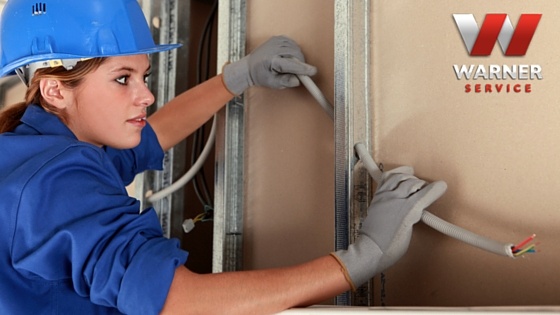
According to the Federal Trade Commission, there are 4 types of contractors, including general, specialty, architecture, and design/build. Contractors are great for small- or large-scale projects for your business, but unknown contractors and empty promises have been known to scam many entrepreneurs and facilities managers. Before you hire just anyone, read up on Warner Service’s top questions to ask:
How long have you been in local business? A contractor, who is more experienced, especially close to your business, will most likely offer a higher quality final product. They will also have a wider network of subcontractors and suppliers in the area.
Who are your suppliers and subcontractors? An upstanding commercial contractor will have no problem telling you where they get their supplies. Whether it’s a long-lasting air conditioning unit or a few solid copper pipes, projects and renovations are only as good as their craftsmanship, which begins with trustworthy supplies.
Can I meet the team? You’ll want to know who’s working on your commercial project before they get started. From the job foreman to the workers and subcontractors, an A team is necessary for a top-notch project. (You can meet our experienced team here.)
Do you have references? A portfolio of professional projects is great, but so are a few reputable references and good reviews. Ask your potential commercial contractor for some case studies because an established company should be able to back up their superior reputation.
Can you please itemize the project? Many contractors will give you a bottom-line price for a project. However, this makes it difficult to see what exactly you’re being charged for. By asking the contractor to itemize the project, you’ll be able to see the costs for each element of the job and accurately compare competitor prices. This also creates documentation, which can help eliminate pricing disputes later.
Is this an estimate? The difference between an estimate and a fixed price can be hundreds of dollars. If the contractor offers an estimate because he or she doesn’t know exactly what the project will entail, inquire about similar past projects, so you can get a clearer understanding of the final numbers.
Is your business insured? A huge part of a good business is using best practices, which includes staying up-to-date on all of the necessary paperwork. If anything goes awry, causing damage to the project or workers, an insurance certificate is your golden ticket. You should look for compensation coverage of workers and liability insurance or property damage coverage. When you ask for this, check the contractor’s licensing information, building permits, and zoning laws.
What does the contract include? If you’re nervous about hiring a commercial contractor, the best way to ease your mind is to read the fine print. A concise, clear contract should include:
- The name, address, and phone number of the company
- The company’s license number
- Your name, address, and phone number
- Name and address of all distributors, manufacturers, suppliers and subcontractors
- Cost of the project
- Estimated start and completion dates
- Payment schedule for contractors, subcontractors, and suppliers
- Contractor’s obligation to obtain all necessary permits
- Change order policies
- List of materials, including product model, color, size, and brand
- Warranty information
- Services provided
- Verbal agreements
- Written statement of your right to cancel the contract with a specific period of time (typically 3 business days)
After hiring your desired contractor, keep all of the records and make sure that the final product is to your liking before you sign the check. If you’d like more information on how to handle hiring contractors, click below to download our must-ask questions checklist. If you’d like to see how Warner Service could help your commercial site, contact us.


